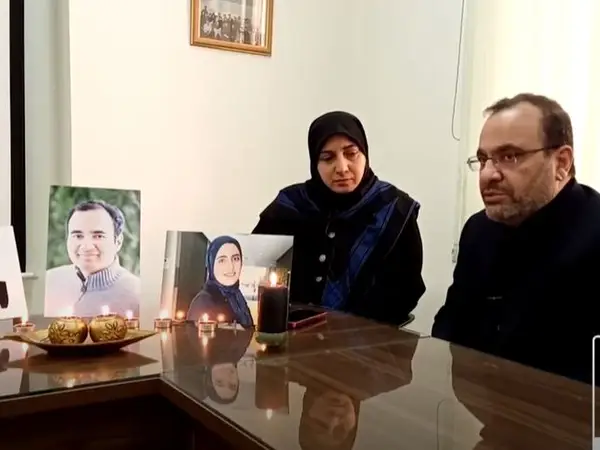Parents of two victims in the downing of an airliner say it was used as a "human shield" to prevent possible US retaliation in the wake of Iran's missile attack on US bases in 2020.
Dr Mohsen Asadi-Lari, a former high-ranking health ministry official, and his wife Dr Zahra Majd who lost both their children, Mohammad-Hossein and Zeinab, in the downing of the Ukrainian plane on January 8, 2020 have broken their silence about the incident which they say cannot be reduced to "human error" as Iranian authorities claim.
"We have concluded that they used the plane as human shield. I'll be frank … They probably wanted to down it and blame it on the US," Asadi-Lari told Ensaf News, a reformist website, in a long interview conducted Tuesday but published Saturday. He also claimed that similar incidents have happened in the past but did not cite any particular example.
Apparently referring to remarks made by Revolutionary Guard (IRGC) officials, Asadi-Lari said officials have admitted that a war with the US could happen if the plane was not shot down. "They say if the plane was not downed a difficult war would happen the next day. The US would have attacked, and ten million lives would be in danger."
An early-morning disaster
Ukraine's flight PS752 was shot down by two air-defense missiles fired by the IRGC on January 8, 2020, as it took off from Tehran’s Imam Khomeini International Airport. Only hours earlier, the IRGC had fired more than a dozen missiles at Iraqi bases hosting US and coalition troops in retaliation for the killing of the IRGC Qods Force Commander Qasem Soleimani who was targeted and killed in Baghdad by a US drone strike just five days earlier.
Despite expecting retaliation from the US, the IRGC which is responsible for air defense of the capital did not close the civilian airspace in the early morning hours of January 8.
Secretary of Ukraine’s national security and defense council, Oleksiy Danilov, in April told Canada's The Globe and Mail that he believed the downing of the plane was a "deliberate attack" to prevent retaliation for Iran's attack on US forces in Iraq.
The Asadi-Lari family criticized Iran's trial of ten low-ranking military personnel which began in November in Tehran, saying that they were not even sure about the identities of those on trial, as defendants always sat with their backs to the plaintiffs during court sessions.
"The actions taken by the team that planned, ordered, and carried out the firing [of the missiles at the plane] have not been included in the case files," Asadi-Lari said in another interview published Saturday by the Iranian Students News Agency (ISNA). "What happened later, including the cleaning up of the scene and pillage of the belongings of the passengers, destruction or confiscation of some of their belongings [such as electronic devices and phones] are also among the things that should have been reflected in the case files."
Asadi-Laris also accused the authorities of "increasingly distorting the truth". "Woefully, they are adding up to the atmosphere of fear and intimidation," Asadi-Lari told Ensaf News, adding that the families who live in Iran have kept their silence and not spoken with the media out of fear of retribution.
Families desparate for truth and justice
In his interview with ISNA, Asadi-Lari said that more than 100 families including his family have filed lawsuits with the Iranian judiciary for the prosecution of those responsible, but the court has ignored their claims against some officials including IRGC Aerospace Commander Brigadier General Amir-Ali Hajizadeh.
Hajizadeh took responsibility for the incident three days after official denials of the truth about the incident. Victims' families were informed by Tehran Military Prosecutor's Office in August that Hajizadeh and eight others had been given immunity from prosecution.
Since the admission, Tehran has refused to allow an independent investigation into the incident and according to Ukraine and Canada that had dozens of citizens and permanent residents aboard, has not provided full and convincing answers to questions that can shed light as to what really happened.
On Saturday, Canada in response to an inquiry by Iran International called Iran's downing “a Canadian tragedy” and called for justice and transparency.
A Canadian court just recently awarded C$107 million ($84 million) to the families of six people who had sued Iran. More court cases are pending in Canada.
Lari and his wife, both professors of Iran Medical Sciences University, say the whole family, including their two children who were students in Canadian universities, were devastated by Soleimani's killing and were very worried about a US retaliation for Iran's missile attack while the family was on their way to the airport. Before the flight took off, their son Mohammad-Hossein had been praying for Soleimani who was buried the day before.
Unlike parents and family members of many other victims of the tragedy that killed all 176 onboard, the Asadi-Lari family are not members of the Canada-based association representing the victims' families. The association does not recognize the eligibility of the Islamic Republic's Judiciary for the investigation of the incident and has repeatedly called for top Iranian officials, including Supreme Leader Ali Khamenei as commander-in-chief of the Armed Forces, to be held responsible.
